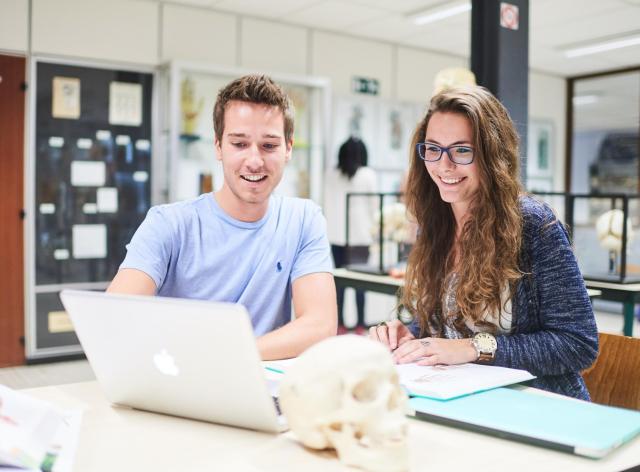Learning about communication and the caregiver-patient relationship
"No matter how much a doctor knows, if he is unable to engage in good communication with his patient, he will be of no help" (Asnani, 2009). In order to promote the transfer of scientific findings and meet patients' demands, we are training medical and pharmacy undergraduates in relational and communication skills, based on the Calgary-Cambridge interview model (Kurtz et al., 2003). We will enable them to develop these human skills by means of simulation, and more specifically role-playing (filmed and recorded). In parallel, studies are being carried out, to analyze the antecedents and consequences of this learning, via a mixed methodology: both qualitative and quantitative (data collection via questionnaires, use of biological measurements and focus groups).
Psychosocial research
The objective concerns the longitudinal study of well-being and quality of life in healthy subjects. The aim will be to gain a better understanding of the factors that contribute most to predicting well-being and quality of life, which may be related, according to the definition given by the World Health Organization in 1994, to the person's physical health, psychological state, level of independence, social relationships, personal beliefs and relationship with the specifics of his or her environment.
Exploring reality and new media: from big data to personalized healthcare
Martin Desseilles and Renaud Lambiotte organize informal meetings, called eStorming meetings, on reality exploration and new media, during which participants are invited to present feature articles and the status of their research projects. The idea is to provide a window of time where creativity and innovation are encouraged, and cutting-edge research questions are identified. eStorming meetings are an opportunity to explore new directions through discussion and interaction. Once we've identified an important idea, we'll carry out a small-scale experiment to test the concept and, if successful, apply for further funding to develop it fully. If you are interested in participating in or attending one of these eStorming meetings, please send an email to eStorming@mentalthealthsciences.com
Previous projects include a master's thesis on hyperlearning (i.e. using current technologies to enhance memory) and a master's thesis on motor paternity detection using Kinect.
Clinical hypnosis
Under the impetus of Dr Vladimir Zelinka, hypnotherapist and scientific collaborator in the Department of Psychology, clinical hypnosis is used in various research protocols focusing on therapeutic compliance, memorization and representations of suggestion. Read more
Stress and aging: a transdisciplinary research approach
In this project, the aim is to integrate the transdisciplinary study of aging through a theoretical analysis of the concept of stress. The subjective definition of stress (sociological and psychological surveys) is compared with objective markers of stress (biological markers). The study of stress sheds light on the concepts of healthy aging and active aging. More specifically, it also provides policy recommendations for improving the quality of life of older people in the future.
Food and mental health
This research proposes a biopsychosocial perspective on the links between mental health and nutrition, in particular links between nutrition, its social role and mental health. The act of eating is studied as a social integrator and regulator, in the light of Durkheim's theorization of suicide. Eating is also examined as self-destruction, with specific cases of "food-related suicides". Meal destructuring and alienating foods are identified as factors contributing to the breakdown of "nutritional patterns". We then discuss the place of diet in psychopathology, and finally the links between biological parameters reflected by diet and psychopathological vulnerability. Avenues for research and intervention in line with this bio-psychosocial approach are also proposed.
Animal behavior technology platform
This project proposes to test the performance of mice in a variety of tasks selected to detect subtle changes in motor behavior, as well as minimal changes at the cognitive level.
Each category of behavior can be analyzed using one or more tests:
- locomotion
- anxiety-related behaviors
- depression-related behaviors
- schizophrenia-related behaviors
- pain sensitivity
- learning and memory
- social, sexual and reproductive behaviors as well as addiction-related behaviors
Partners:
Claire DIEDERICH, Unité de recherche vétérinaire intégrée (URVI), project leader, member of the Commission d'éthique en expérimentation animale
Anne VERMEYLEN, secretary of the Commission d'éthique en expérimentation animale, veterinarian responsible for animal welfare at the University of Namur
Neuropsychology
The BAWL (William Lennox Attention Battery) is a computerized tool for assessing various attentional components. It was developed for neuropsychological purposes. However, it can also be used for other purposes: in psychiatry, cognitive psychology, gerontology, as a complement to physiological examinations, etc. Given its structure, it is aimed more specifically at the assessment of adult subjects (no standards for child populations). Find out more.
Research in mental health sciences
Those interested in a thesis, dissertation or post-doctorate are asked to write and send a CV to martin.desseilles@unamur.be
Contact
Université de Namur, non-profit association
Rue de Bruxelles, 61, 5000 Namur
Tel: +32 81 72.41.53
Secretariat: katty.lamoline@unamur.be
Clinical issue: QuestionClinique@mentalhealthsciences.com
Academic issue: info@mentalhealthsciences.com




